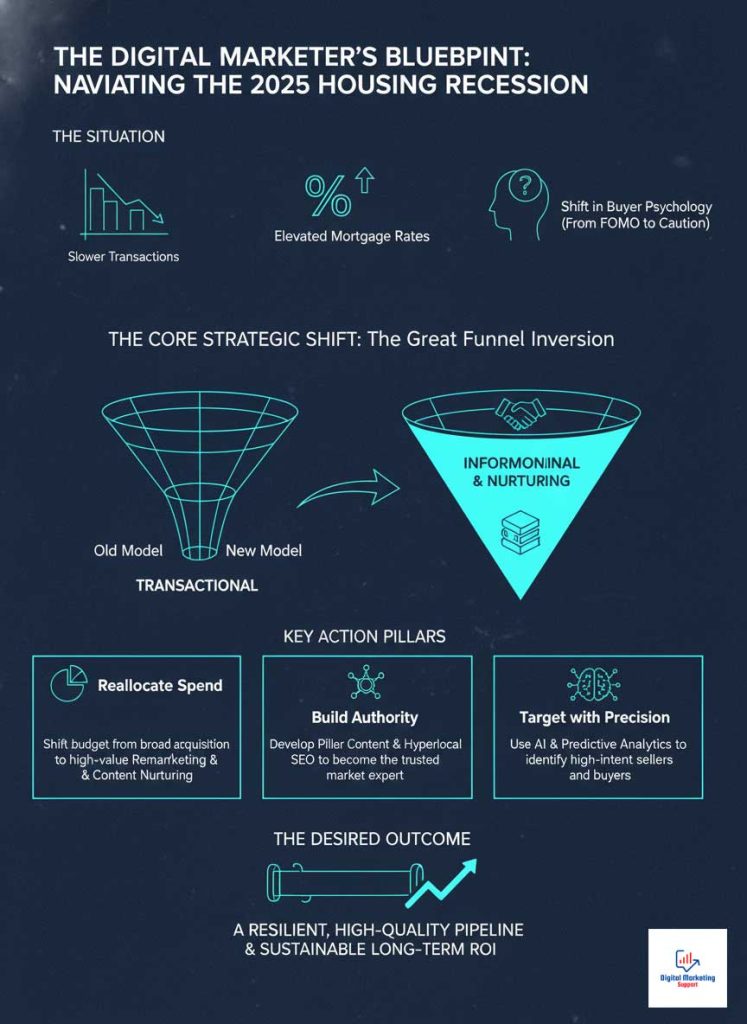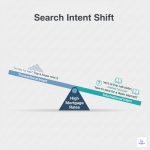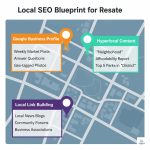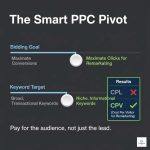The U.S. housing market has officially entered a recession in 2025, a stark contrast to the frenetic pace of recent years. With 30-year fixed mortgage rates settling in the 6.1–6.3% range as of early November 2025, transaction volumes have slowed, and inventory is rising in many regions. This economic shift, coupled with advancements in marketing technology like generative AI, creates a complex new landscape for digital marketers in the real estate sector.
Table of Contents
Navigating the U.S. housing market recession 2025 requires more than just budget cuts; it demands a fundamental strategic pivot. The old playbook of focusing on bottom-funnel, transactional keywords is no longer effective. Consumer psychology has shifted from urgent buying to cautious, long-term planning, and your marketing must shift with it to protect traffic, conversions, and ROI.

This comprehensive guide provides a data-driven, actionable framework for real estate marketers. We will break down the immediate tactical shifts, mid-term content strategies, and advanced AI-powered techniques needed to not only survive but thrive in this downturn. The focus is on a sophisticated real estate digital marketing strategy 2025 that builds authority and a resilient pipeline.

The New Reality: How the 2025 Housing Recession Redefines Real Estate Marketing
The current market is defined by a deep psychological shift in the consumer. The fear of missing out (FOMO) has been replaced by a fear of a bad buy (FOBB). This fundamental change in sentiment is the primary driver behind the necessary evolution of your marketing.
Core Concept: The Great Funnel Inversion — From Transactional to Informational
The most significant impact of housing recession on marketing is the inversion of the traditional sales funnel. Where the journey was once short and direct, it is now long, winding, and heavily weighted toward the top and middle—the research and consideration stages.

Your potential clients are no longer looking for an agent to simply open a door; they are looking for a trusted advisor to help them navigate economic uncertainty. They are consuming vast amounts of content, comparing options, and delaying decisions. This is why a purely transactional marketing strategy economic downturn USA is doomed to fail.
The goal is no longer to capture the immediate sale but to capture the audience’s attention and trust for the long haul. Marketers who fail to adapt will see lead quality plummet and customer acquisition costs (CAC) soar as they compete for a shrinking pool of transaction-ready leads.
Latest Industry Trends & Data: Reading the Economic Tea Leaves
Data provides the context for our strategic pivot. Understanding the numbers behind the slowdown is crucial for making informed marketing decisions that address real-world consumer concerns.
Mortgage Rates and Their Ripple Effect
Recent data from Freddie Mac confirms that sustained rates above 6% have dramatically cooled the market. These mortgage rate effects on consumer demand are clearly visible in search trends, where queries for “homes for sale” have flattened while searches for “mortgage rate forecasts” and “housing market predictions 2026” have surged.
Housing Inventory and Consumer Behavior
Analysis from the National Association of Realtors (NAR) shows that the months of supply for housing inventory have increased significantly. This shift from a seller’s to a more balanced, or even buyer’s, market directly influences housing affordability and consumer behavior. Buyers feel less pressure, take more time, and demand more value and information before committing.
Economic Anxiety and Market Sentiment
Data from sources like the University of Michigan Surveys of Consumers reveals a high level of economic anxiety. This sentiment directly correlates with a reluctance to make large financial commitments. Your marketing message must acknowledge this anxiety and offer reassurance through data-driven insights and expert guidance, forming the core of your recession marketing playbook.
The Immediate Response: A 90-Day Sprint to Stabilize and Optimize Your Marketing
In a volatile market, rapid and decisive action is critical. The following strategies are designed to be implemented within the next 90 days to stabilize performance, cut waste, and align your efforts with the new consumer mindset.
Practical Strategy 1: The Paid Media Budget Reallocation Framework
Your budget is your most powerful tool, and in a downturn, it must be wielded with surgical precision. It’s time to re-evaluate every dollar of ad spend through the lens of efficiency and long-term value, making smart paid media budget reallocations in downturn.

- Audit and Cut Waste: Immediately pause the bottom 15-20% of your underperforming acquisition campaigns. These are typically broad-match campaigns with high CPAs that are no longer delivering quality leads.
- Double Down on Nurturing: Reallocate 30-40% of that saved budget directly into remarketing and CRM nurture campaigns. Your existing database and website visitors are your most valuable assets right now.
- Invest in Audience Growth: Dedicate a portion of the budget to content syndication on platforms like Outbrain or Taboola. Promote your high-value educational content to build your email list with “rate-watchers” and future buyers.
A prime example of this in action comes from a regional broker who shifted 30% of their budget from pure acquisition to remarketing and value-content (like neighborhood affordability reports). They successfully reduced their cost per lead by 24% while maintaining their close rates—a testament to the power of this strategic shift.
Practical Strategy 2: A Deep Dive into PPC Bidding and Keyword Strategy
The question of how should real estate marketers change paid search during a housing recession 2025 is one of the most pressing. The answer lies in a complete overhaul of your keyword strategy and bidding models to reflect the shift in search intent.
PPC Bidding Strategy Table: Boom vs. Recession
| Bidding Strategy | Boom Market Approach (High Intent) | Recession Market Approach (Shifting Intent) |
| Primary Goal | Maximize Conversions (Lead Forms, Calls) | Maximize Clicks on Info Content, Build Remarketing Lists, Micro-Conversions |
| Keyword Focus | “luxury homes for sale [city]” (Broad Match) | “[city] housing market trends 2025” (Phrase/Exact Match), “rent vs buy calculator” |
| Ad Copy CTA | “Schedule a Showing Now!” / “View Listings” | “Download Free Market Report” / “Sign Up for Rate Alerts” |
| Bidding Model | Target CPA (tCPA) or Maximize Conversions | Enhanced CPC (eCPC), Maximize Clicks, or Target Impression Share on key info terms |
| Landing Page | Property Listing Page (LP) | Blog Post, Gated Resource Page, or Interactive Tool |
Practical Strategy 3: Local SEO Checklist for Capturing High-Intent Micro-Markets
While the national U.S. housing market recession 2025 dominates headlines, real estate remains fundamentally local. A robust strategy for local search optimization for real estate can help you dominate stable or resilient micro-markets.
Here is a local SEO checklist for brokers during slow market conditions:
- Hyper-Optimize Your Google Business Profile (GBP): Update your GBP weekly with new photos, posts about local market statistics, and answers to community questions. Use local keywords in your business description.
- Publish Hyperlocal Content: Create and promote neighborhood-specific market reports and guides. Content like “The 5 Most Affordable Neighborhoods in [City] for Families in 2025” is highly valuable and shareable.
- Generate Local Backlinks: Share your hyperlocal data with local news bloggers, journalists, and community forums. A single high-authority local backlink can significantly boost your map pack ranking.
- Ensure NAP Consistency: Double-check that your Name, Address, and Phone number are identical across all online directories (Yelp, Zillow, etc.). Inconsistencies can harm local search visibility.
Building a Resilient Pipeline: Mid-Term Content & Nurturing Strategies (3-9 Months)
Immediate tactical shifts will stop the bleeding, but a long-term real estate digital marketing strategy 2025 is what will set you up for future success. This involves building a powerful content engine and a sophisticated nurturing system.
Content Strategy: The “Recession-Proof” Pillar and Cluster Model
To establish topical authority, you must become the definitive source of information for your market. The pillar-and-cluster model is the most effective SEO strategy for achieving this.

- Your Pillar Page: Create a comprehensive, 3,000+ word guide titled “The Ultimate Guide to Navigating the [Your City] Housing Market in 2025.” This page will serve as the central hub for all your recession-related content.
- Your Cluster Content: Develop a content calendar topics for housing affordability and buyer education 2025 with articles that address specific pain points and link back to your pillar page.
- For Buyers: “How a 1% Rate Change Impacts Your Monthly Payment,” “5 Down Payment Assistance Programs in [State] You Need to Know About.”
- For Sellers: “Is Now a Good Time to Sell? A Data-Driven Analysis,” “How to Price Your Home Competitively in a Slower Market.”
This approach includes creating organic content ideas for mortgage-sensitive audiences, positioning you as an empathetic expert.
Lead Generation: Swapping Hard Sells for High-Value Tools
In a market defined by caution, aggressive sales tactics are ineffective. Instead, focus on lead generation through high-value, interactive tools that empower the consumer.
- Interactive Calculators: Develop and embed calculators for mortgage payments, rent vs. buy analysis, and home affordability. These are powerful lead magnets.
- Gated High-Value Assets: Offer downloadable neighborhood reports, annual market forecasts, or webinar recordings in exchange for an email address. This is key to building your CRM database for CRM nurturing during slow sales cycles.
The Power of Nurturing: Mastering the Long Sales Cycle with Your CRM
The conversation around lead quality vs lead volume in real estate has never been more relevant. A smaller database of engaged, nurtured leads is infinitely more valuable than a massive list of cold contacts.
- Segment Your Audience: Your CRM should be segmented based on behavior. A user who downloaded a buyer’s guide should receive a different email sequence than one who used a home valuation tool.
- Automate with Triggers: Use behavioral triggers to send timely, relevant content. If a contact revisits a saved search on your website, an automated email with a market update for that specific neighborhood can be incredibly effective.
The Advanced Playbook: Using AI and Data to Outmaneuver the Competition
Standard digital marketing practices will only get you so far in the current climate. To truly gain a competitive edge, you must embrace advanced data analytics and artificial intelligence.
AI & Segmentation: From Broad Strokes to Surgical Precision
AI allows for a level of audience understanding that was previously impossible. This is where you can implement a truly sophisticated marketing strategy economic downturn USA.

Using AI for Advanced Segmentation
The challenge of using AI to segment homeowners with high equity vs distressed sellers can be solved with predictive analytics.
- Propensity Scoring: Use machine learning models to analyze public data (time in home, property records, local market trends) and internal data (CRM activity) to assign a “propensity to sell” score to homeowners in your database. This allows your sales team to focus on the most likely movers.
- AI Content Personalization: The next frontier is AI content personalization for lower-intent traffic. Tools can now dynamically change your website’s hero section, headlines, and CTAs based on a visitor’s detected intent (e.g., showing a first-time buyer guide to new visitors vs. a market report to returning users).
Redefining Success: Analytics and Attribution for a New Market
The impact of housing recession on marketing extends to how we measure success. Last-click attribution is dangerously misleading when the sales cycle can be six months or longer.
It is essential to make attribution adjustments in changing demand. Shift your analytics from a last-click model to a time-decay or position-based model. This gives proper credit to the crucial top-of-funnel blog posts and mid-funnel guides that influence the final decision. Track metrics like lead-to-listing velocity and pipeline duration to identify friction points in the longer sales journey.
Marketing Framework Comparison: Boom vs. Recession

| Marketing Pillar | Boom Market Strategy (Urgency-Driven) | Recession Market Strategy (Value-Driven) |
| Core Messaging | “Don’t Miss Out!” “Hot Market!” “Bidding Wars!” | “Plan Your Future.” “Make an Informed Decision.” “Navigate with Confidence.” |
| Target Audience | All active buyers and sellers (broad targeting). | Segmented: Equity-rich sellers, rate-watchers, first-time buyers needing education. |
| Primary Offer | “Get a Free Home Valuation” (Transactional) | “Sign Up for Rate Alerts” / “Download our Buyer’s Guide” (Informational) |
| Content Focus | New listings, open houses, success stories, high-end features. | Market analysis, affordability guides, financial planning, refinancing options. |
| Channel Priority | High-spend on Zillow, Google Ads (Transactional keywords). | SEO, Content Syndication, Email Nurturing, Remarketing, Local SEO. |
| Success Metric | Lead Volume, Cost Per Lead (CPL), Appointment Set Rate. | Lead Quality, Pipeline Velocity, Audience Growth, Customer Lifetime Value (LTV). |
Summary & Key Takeaways: Your Path Forward
The U.S. housing market recession 2025 is not a signal to panic, but a mandate to adapt with intelligence and foresight. The winning marketing strategy in this economic downturn is one built on empathy, education, and the creation of long-term value. It’s a marathon, not a sprint.

Key Action Items:
- Shift Your Mindset: Embrace your role as a trusted advisor, not just a sales agent. Move from a transactional to an informational approach in all your marketing.
- Reallocate Your Budget: Be ruthless in cutting waste from broad acquisition campaigns and reinvest heavily in content, remarketing, and CRM nurturing.
- Master Local SEO: Win in the micro-markets that remain active by becoming the undeniable local expert through hyperlocal content and a perfectly optimized GBP.
- Leverage Technology: Use AI, predictive analytics, and sophisticated attribution models to understand your audience on a deeper level and engage them with personalized content.
The relationships you build and the audience you capture during this slowdown will become your most valuable asset. Marketers who prioritize trust and provide genuine value now will see outsized conversion gains and lower acquisition costs when the market inevitably rebounds.
Frequently Asked Questions (FAQs)
How will a U.S. housing market recession affect my marketing ROI?

A housing market recession will likely decrease your immediate, short-term ROI from acquisition-focused campaigns due to longer sales cycles. However, by shifting your investment to a long-term real estate digital marketing strategy 2025 focused on content and lead nurturing, you can significantly increase your long-term ROI by building a powerful, pre-qualified pipeline for when the market recovers.
Should I pause acquisition and focus on retention during a housing slowdown?

You should not pause acquisition entirely, but rather transform it. Shift your acquisition budget away from expensive, bottom-funnel keywords and toward more cost-effective, top-of-funnel content promotion to attract users in the research phase. This builds your audience for future retention and nurturing efforts.
What ad channels perform best when consumer purchase intent is delayed?

Content-centric channels excel in this environment. SEO, content syndication, and value-driven social media marketing work well for audience building. For paid channels, remarketing across Google and social platforms is crucial for staying top-of-mind with your existing audience over the long sales cycle.
How do mortgage rates change search intent for real estate keywords?

High mortgage rates cause a clear shift from transactional to informational search intent. Search volume for “homes for sale in [city]” may decrease, while volume for “rent vs buy calculator 2025,” “how to get a lower mortgage rate,” and “[city] housing market forecast” will increase.
What content topics attract renters and prospective buyers when affordability falls?

Content that directly addresses affordability concerns performs best. Focus on topics like down payment assistance programs, guides to up-and-coming affordable neighborhoods, strategies for improving credit scores, and detailed comparisons of renting vs. buying in the current market.
How to use local SEO to capture higher-intent buyers in stable micro-markets?

Focus on creating neighborhood-specific content that highlights unique value propositions (e.g., great schools, new infrastructure). Optimize your Google Business Profile with weekly posts on local market stats and encourage reviews from clients in those specific areas to build social proof.
Which AI tools help identify high-equity sellers for targeted campaigns?

Predictive analytics platforms and advanced CRM systems with AI capabilities can help. These tools analyze public property data, local market trends, and demographic information to create propensity models that score homeowners on their likelihood to sell, even in a down market.
How to adjust bidding strategies when CPCs fall but conversion rates decline?

When conversion rates drop, shift your bidding strategy from “Target CPA” to “Maximize Clicks” or “Enhanced CPC” on informational ad groups. The goal is no longer the immediate conversion but to acquire a visitor for your remarketing list at the lowest possible cost.
What is the most important marketing metric to track during a housing recession?

Pipeline velocity—the time it takes for a new lead to move from initial contact to becoming a client—is a critical metric. A slowing velocity can indicate friction in your sales and nurturing process that needs to be addressed. It’s more important than simple lead volume.
How can I use social media effectively during a housing downturn?

Use social media to distribute your educational content, share timely market updates in short video formats (Reels/Shorts), and host live Q&A sessions with mortgage experts. The goal is to build a community and establish yourself as a go-to resource, not to push listings.
What is the biggest marketing mistake to avoid in a housing recession?

The biggest mistake is to either do nothing or to slash your marketing budget indiscriminately. A strategic reallocation of your budget is essential. The visibility you lose by going dark will be incredibly expensive to regain when the market recovers.
Is it better to focus on lead quality or lead volume in the 2025 market?

The debate over lead quality vs lead volume in real estate is decisively settled in a recession: quality is paramount. It is far more efficient and profitable to nurture a smaller number of highly engaged, long-term prospects than to burn your budget chasing a high volume of low-intent, uncommitted leads.









